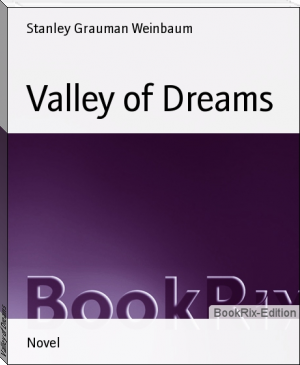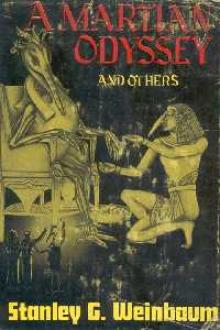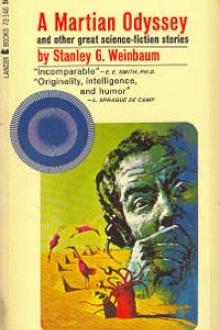Valley of Dreams, Stanley Grauman Weinbaum [ebook reader that looks like a book .txt] 📗

- Author: Stanley Grauman Weinbaum
Book online «Valley of Dreams, Stanley Grauman Weinbaum [ebook reader that looks like a book .txt] 📗». Author Stanley Grauman Weinbaum
with the three trailing us, and then it suddenly occurred to me that my Martian accent might be at fault. I faced the group and tried trilling it out the way Tweel himself did: 'T-r-r-rwee-r-rl!' Like that.
"And that worked! One of them spun his head around a full ninety degrees, and screeched 'T-r-r-rweee-r-rl!' and a moment later, like an arrow from a bow, Tweel came sailing over the nearer huts to land on his beak in front of me!
"Man, we were glad to see each other! Tweel set up a twittering and chirping like a farm in summer and went sailing up and coming down on his beak, and I would have grabbed his hands, only he wouldn't keep still long enough.
"The other Martians and Leroy just stared, and after a while, Tweel stopped bouncing, and there we were. We couldn't talk to each other any more than we could before, so after I'd said 'Tweel' a couple of times and he'd said 'Tick,' we were more or less helpless. However, it was only mid-morning, and it seemed important to learn all we could about Tweel and the city, so I suggested that he guide us around the place if he weren't busy. I put over the idea by pointing back at the buildings and then at him and us.
"Well, apparently he wasn't too busy, for he set off with us, leading the way with one of his hundred and fifty-foot nosedives that set Leroy gasping. When we caught up, he said something like 'one, one, two--two, two, four--no, no--yes, yes--rock--no breet!' That didn't seem to mean anything; perhaps he was just letting Leroy know that he could speak English, or perhaps he was merely running over his vocabulary to refresh his memory.
"Anyway, he showed us around. He had a light of sorts in his black pouch, good enough for small rooms, but simply lost in some of the colossal caverns we went through. Nine out of ten buildings meant absolutely nothing to us--just vast empty chambers, full of shadows and rustlings and echoes. I couldn't imagine their use; they didn't seem suitable for living quarters, or even for commercial purposes--trade and so forth; they might have been all right as power-houses, but what could have been the purpose of a whole city full? And where were the remains of the machinery?
"The place was a mystery. Sometimes Tweel would show us through a hall that would have housed an ocean-liner, and he'd seem to swell with pride--and we couldn't make a damn thing of it! As a display of architectural power, the city was colossal; as anything else it was just nutty!
"But we did see one thing that registered. We came to that same building Leroy and I had entered earlier--the one with the three eyes in it. Well, we were a little shaky about going in there, but Tweel twittered and trilled and kept saying, 'Yes, yes, yes!' so we followed him, staring nervously about for the thing that had watched us. However, that hall was just like the others, full of murmurs and slithering noises and shadowy things slipping away into corners. If the three-eyed creature were still there, it must have slunk away with the others.
"Tweel led us along the wall; his light showed a series of little alcoves, and in the first of these we ran into a puzzling thing--a very weird thing. As the light flashed into the alcove, I saw first just an empty space, and then, squatting on the floor, I saw--it! A little creature about as big as a large rat, it was, gray and huddled and evidently startled by our appearance. It had the queerest, most devilish little face!--pointed ears or horns and satanic eyes that seemed to sparkle with a sort of fiendish intelligence.
"Tweel saw it, too, and let out a screech of anger, and the creature rose on two pencil-thin legs and scuttled off with a half-terrified, half defiant squeak. It darted past us into the darkness too quickly even for Tweel, and as it ran, something waved on its body like the fluttering of a cape. Tweel screeched angrily at it and set up a shrill hullabaloo that sounded like genuine rage.
"But the thing was gone, and then I noticed the weirdest of imaginable details. Where it had squatted on the floor was--a book! It had been hunched over a book!
"I took a step forward; sure enough, there was some sort of inscription on the pages--wavy white lines like a seismograph record on black sheets like the material of Tweel's pouch. Tweel fumed and whistled in wrath, picked up the volume and slammed it into place on a shelf full of others. Leroy and I stared dumbfounded at each other.
"Had the little thing with the fiendish face been reading? Or was it simply eating the pages, getting physical nourishment rather than mental? Or had the whole thing been accidental?
"If the creature were some rat-like pest that destroyed books, Tweel's rage was understandable, but why should he try to prevent an intelligent being, even though of an alien race, from _reading_--if it _was_ reading? I don't know; I did notice that the book was entirely undamaged, nor did I see a damaged book among any that we handled. But I have an odd hunch that if we knew the secret of the little cape-clothed imp, we'd know the mystery of the vast abandoned city and of the decay of Martian culture.
"Well, Tweel quieted down after a while and led us completely around that tremendous hall. It had been a library, I think; at least, there were thousands upon thousands of those queer black-paged volumes printed in wavy lines of white. There were pictures, too, in some; and some of these showed Tweel's people. That's a point, of course; it indicated that his race built the city and printed the books. I don't think the greatest philologist on earth will ever translate one line of those records; they were made by minds too different from ours.
"Tweel could read them, naturally. He twittered off a few lines, and then I took a few of the books, with his permission; he said 'no, no!' to some and 'yes, yes!' to others. Perhaps he kept back the ones his people needed, or perhaps he let me take the ones he thought we'd understand most easily. I don't know; the books are outside there in the rocket.
"Then he held that dim torch of his toward the walls, and they were pictured. Lord, what pictures! They stretched up and up into the blackness of the roof, mysterious and gigantic. I couldn't make much of the first wall; it seemed to be a portrayal of a great assembly of Tweel's people. Perhaps it was meant to symbolize Society or Government. But the next wall was more obvious; it showed creatures at work on a colossal machine of some sort, and that would be Industry or Science. The back wall had corroded away in part, from what we could see, I suspected the scene was meant to portray Art, but it was on the fourth wall that we got a shock that nearly dazed us.
"I think the symbol was Exploration or Discovery. This wall was a little plainer, because the moving beam of daylight from that crack lit up the higher surface and Tweel's torch illuminated the lower. We made out a giant seated figure, one of the beaked Martians like Tweel, but with every limb suggesting heaviness, weariness. The arms dropped inertly on the chair, the thin neck bent and the beak rested on the body, as if the creature could scarcely bear its own weight. And before it was a queer kneeling figure, and at sight of it, Leroy and I almost reeled against each other. It was, apparently, a man!"
"A man!" bellowed Harrison. "A man you say?"
"I said apparently," retorted Jarvis. "The artist had exaggerated the nose almost to the length of Tweel's beak, but the figure had black shoulder-length hair, and instead of the Martian four, there were _five_ fingers on its outstretched hand! It was kneeling as if in worship of the Martian, and on the ground was what looked like a pottery bowl full of some food as an offering. Well! Leroy and I thought we'd gone screwy!"
"And Putz and I think so, too!" roared the captain.
"Maybe we all have," replied Jarvis, with a faint grin at the pale face of the little Frenchman, who returned it in silence. "Anyway," he continued, "Tweel was squeaking and pointing at the figure, and saying 'Tick! Tick!' so he recognized the resemblance--and never mind any cracks about my nose!" he warned the captain. "It was Leroy who made the important comment; he looked at the Martian and said 'Thoth! The god Thoth!'"
"_Oui!_" confirmed the biologist. "_Comme l'Egypte!_"
"Yeah," said Jarvis. "Like the Egyptian ibis-headed god--the one with the beak. Well, no sooner did Tweel hear the name Thoth than he set up a clamor of twittering and squeaking. He pointed at himself and said 'Thoth! Thoth!' and then waved his arm all around and repeated it. Of course he often did queer things, but we both thought we understood what he meant. He was trying to tell us that his race called themselves Thoth. Do you see what I'm getting at?"
"I see, all right," said Harrison. "You think the Martians paid a visit to the earth, and the Egyptians remembered it in their mythology. Well, you're off, then; there wasn't any Egyptian civilization fifteen thousand years ago."
"Wrong!" grinned Jarvis. "It's too bad we _haven't_ an archeologist with us, but Leroy tells me that there was a stone-age culture in Egypt then, the pre-dynastic civilization."
"Well, even so, what of it?"
"Plenty! Everything in that picture proves my point. The attitude of the Martian, heavy and weary--that's the unnatural strain of terrestrial gravitation. The name Thoth; Leroy tells me Thoth was the Egyptian god of philosophy and the inventor of _writing_! Get that? They must have picked up the idea from watching the Martian take notes. It's too much for coincidence that Thoth should be beaked and ibis-headed, and that the beaked Martians call themselves Thoth."
"Well, I'll be hanged! But what about the nose on the Egyptian? Do you mean to tell me that stone-age Egyptians had longer noses than ordinary men?"
"Of course not! It's just that the Martians very naturally cast their paintings in Martianized form. Don't human beings tend to relate everything to themselves? That's why dugongs and manatees started the mermaid myths--sailors thought they saw human features on the beasts. So the Martian artist, drawing either from descriptions or imperfect photographs, naturally exaggerated the size of the human nose to a degree that looked normal to him. Or anyway, that's my theory."
"Well, it'll do as a theory," grunted Harrison. "What I want to hear is why you two got back here looking like a couple of year-before-last bird's nests."
Jarvis shuddered again, and cast another glance at Leroy. The little biologist was recovering some of his accustomed poise, but he returned the glance with an echo of the chemist's shudder.
"We'll get to that," resumed the latter. "Meanwhile I'll stick to Tweel and his people. We spent the better part of three days with them, as you know. I can't give every detail, but I'll summarize the important facts and give our conclusions, which may not be worth an inflated franc. It's hard to judge this dried-up world by earthly standards.
"We took pictures of everything possible; I even tried to photograph that gigantic mural in the library, but unless Tweel's lamp
"And that worked! One of them spun his head around a full ninety degrees, and screeched 'T-r-r-rweee-r-rl!' and a moment later, like an arrow from a bow, Tweel came sailing over the nearer huts to land on his beak in front of me!
"Man, we were glad to see each other! Tweel set up a twittering and chirping like a farm in summer and went sailing up and coming down on his beak, and I would have grabbed his hands, only he wouldn't keep still long enough.
"The other Martians and Leroy just stared, and after a while, Tweel stopped bouncing, and there we were. We couldn't talk to each other any more than we could before, so after I'd said 'Tweel' a couple of times and he'd said 'Tick,' we were more or less helpless. However, it was only mid-morning, and it seemed important to learn all we could about Tweel and the city, so I suggested that he guide us around the place if he weren't busy. I put over the idea by pointing back at the buildings and then at him and us.
"Well, apparently he wasn't too busy, for he set off with us, leading the way with one of his hundred and fifty-foot nosedives that set Leroy gasping. When we caught up, he said something like 'one, one, two--two, two, four--no, no--yes, yes--rock--no breet!' That didn't seem to mean anything; perhaps he was just letting Leroy know that he could speak English, or perhaps he was merely running over his vocabulary to refresh his memory.
"Anyway, he showed us around. He had a light of sorts in his black pouch, good enough for small rooms, but simply lost in some of the colossal caverns we went through. Nine out of ten buildings meant absolutely nothing to us--just vast empty chambers, full of shadows and rustlings and echoes. I couldn't imagine their use; they didn't seem suitable for living quarters, or even for commercial purposes--trade and so forth; they might have been all right as power-houses, but what could have been the purpose of a whole city full? And where were the remains of the machinery?
"The place was a mystery. Sometimes Tweel would show us through a hall that would have housed an ocean-liner, and he'd seem to swell with pride--and we couldn't make a damn thing of it! As a display of architectural power, the city was colossal; as anything else it was just nutty!
"But we did see one thing that registered. We came to that same building Leroy and I had entered earlier--the one with the three eyes in it. Well, we were a little shaky about going in there, but Tweel twittered and trilled and kept saying, 'Yes, yes, yes!' so we followed him, staring nervously about for the thing that had watched us. However, that hall was just like the others, full of murmurs and slithering noises and shadowy things slipping away into corners. If the three-eyed creature were still there, it must have slunk away with the others.
"Tweel led us along the wall; his light showed a series of little alcoves, and in the first of these we ran into a puzzling thing--a very weird thing. As the light flashed into the alcove, I saw first just an empty space, and then, squatting on the floor, I saw--it! A little creature about as big as a large rat, it was, gray and huddled and evidently startled by our appearance. It had the queerest, most devilish little face!--pointed ears or horns and satanic eyes that seemed to sparkle with a sort of fiendish intelligence.
"Tweel saw it, too, and let out a screech of anger, and the creature rose on two pencil-thin legs and scuttled off with a half-terrified, half defiant squeak. It darted past us into the darkness too quickly even for Tweel, and as it ran, something waved on its body like the fluttering of a cape. Tweel screeched angrily at it and set up a shrill hullabaloo that sounded like genuine rage.
"But the thing was gone, and then I noticed the weirdest of imaginable details. Where it had squatted on the floor was--a book! It had been hunched over a book!
"I took a step forward; sure enough, there was some sort of inscription on the pages--wavy white lines like a seismograph record on black sheets like the material of Tweel's pouch. Tweel fumed and whistled in wrath, picked up the volume and slammed it into place on a shelf full of others. Leroy and I stared dumbfounded at each other.
"Had the little thing with the fiendish face been reading? Or was it simply eating the pages, getting physical nourishment rather than mental? Or had the whole thing been accidental?
"If the creature were some rat-like pest that destroyed books, Tweel's rage was understandable, but why should he try to prevent an intelligent being, even though of an alien race, from _reading_--if it _was_ reading? I don't know; I did notice that the book was entirely undamaged, nor did I see a damaged book among any that we handled. But I have an odd hunch that if we knew the secret of the little cape-clothed imp, we'd know the mystery of the vast abandoned city and of the decay of Martian culture.
"Well, Tweel quieted down after a while and led us completely around that tremendous hall. It had been a library, I think; at least, there were thousands upon thousands of those queer black-paged volumes printed in wavy lines of white. There were pictures, too, in some; and some of these showed Tweel's people. That's a point, of course; it indicated that his race built the city and printed the books. I don't think the greatest philologist on earth will ever translate one line of those records; they were made by minds too different from ours.
"Tweel could read them, naturally. He twittered off a few lines, and then I took a few of the books, with his permission; he said 'no, no!' to some and 'yes, yes!' to others. Perhaps he kept back the ones his people needed, or perhaps he let me take the ones he thought we'd understand most easily. I don't know; the books are outside there in the rocket.
"Then he held that dim torch of his toward the walls, and they were pictured. Lord, what pictures! They stretched up and up into the blackness of the roof, mysterious and gigantic. I couldn't make much of the first wall; it seemed to be a portrayal of a great assembly of Tweel's people. Perhaps it was meant to symbolize Society or Government. But the next wall was more obvious; it showed creatures at work on a colossal machine of some sort, and that would be Industry or Science. The back wall had corroded away in part, from what we could see, I suspected the scene was meant to portray Art, but it was on the fourth wall that we got a shock that nearly dazed us.
"I think the symbol was Exploration or Discovery. This wall was a little plainer, because the moving beam of daylight from that crack lit up the higher surface and Tweel's torch illuminated the lower. We made out a giant seated figure, one of the beaked Martians like Tweel, but with every limb suggesting heaviness, weariness. The arms dropped inertly on the chair, the thin neck bent and the beak rested on the body, as if the creature could scarcely bear its own weight. And before it was a queer kneeling figure, and at sight of it, Leroy and I almost reeled against each other. It was, apparently, a man!"
"A man!" bellowed Harrison. "A man you say?"
"I said apparently," retorted Jarvis. "The artist had exaggerated the nose almost to the length of Tweel's beak, but the figure had black shoulder-length hair, and instead of the Martian four, there were _five_ fingers on its outstretched hand! It was kneeling as if in worship of the Martian, and on the ground was what looked like a pottery bowl full of some food as an offering. Well! Leroy and I thought we'd gone screwy!"
"And Putz and I think so, too!" roared the captain.
"Maybe we all have," replied Jarvis, with a faint grin at the pale face of the little Frenchman, who returned it in silence. "Anyway," he continued, "Tweel was squeaking and pointing at the figure, and saying 'Tick! Tick!' so he recognized the resemblance--and never mind any cracks about my nose!" he warned the captain. "It was Leroy who made the important comment; he looked at the Martian and said 'Thoth! The god Thoth!'"
"_Oui!_" confirmed the biologist. "_Comme l'Egypte!_"
"Yeah," said Jarvis. "Like the Egyptian ibis-headed god--the one with the beak. Well, no sooner did Tweel hear the name Thoth than he set up a clamor of twittering and squeaking. He pointed at himself and said 'Thoth! Thoth!' and then waved his arm all around and repeated it. Of course he often did queer things, but we both thought we understood what he meant. He was trying to tell us that his race called themselves Thoth. Do you see what I'm getting at?"
"I see, all right," said Harrison. "You think the Martians paid a visit to the earth, and the Egyptians remembered it in their mythology. Well, you're off, then; there wasn't any Egyptian civilization fifteen thousand years ago."
"Wrong!" grinned Jarvis. "It's too bad we _haven't_ an archeologist with us, but Leroy tells me that there was a stone-age culture in Egypt then, the pre-dynastic civilization."
"Well, even so, what of it?"
"Plenty! Everything in that picture proves my point. The attitude of the Martian, heavy and weary--that's the unnatural strain of terrestrial gravitation. The name Thoth; Leroy tells me Thoth was the Egyptian god of philosophy and the inventor of _writing_! Get that? They must have picked up the idea from watching the Martian take notes. It's too much for coincidence that Thoth should be beaked and ibis-headed, and that the beaked Martians call themselves Thoth."
"Well, I'll be hanged! But what about the nose on the Egyptian? Do you mean to tell me that stone-age Egyptians had longer noses than ordinary men?"
"Of course not! It's just that the Martians very naturally cast their paintings in Martianized form. Don't human beings tend to relate everything to themselves? That's why dugongs and manatees started the mermaid myths--sailors thought they saw human features on the beasts. So the Martian artist, drawing either from descriptions or imperfect photographs, naturally exaggerated the size of the human nose to a degree that looked normal to him. Or anyway, that's my theory."
"Well, it'll do as a theory," grunted Harrison. "What I want to hear is why you two got back here looking like a couple of year-before-last bird's nests."
Jarvis shuddered again, and cast another glance at Leroy. The little biologist was recovering some of his accustomed poise, but he returned the glance with an echo of the chemist's shudder.
"We'll get to that," resumed the latter. "Meanwhile I'll stick to Tweel and his people. We spent the better part of three days with them, as you know. I can't give every detail, but I'll summarize the important facts and give our conclusions, which may not be worth an inflated franc. It's hard to judge this dried-up world by earthly standards.
"We took pictures of everything possible; I even tried to photograph that gigantic mural in the library, but unless Tweel's lamp
Free e-book «Valley of Dreams, Stanley Grauman Weinbaum [ebook reader that looks like a book .txt] 📗» - read online now
Similar e-books:





Comments (0)